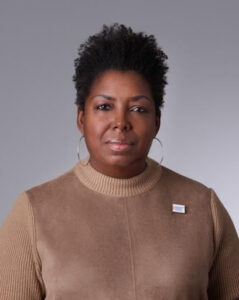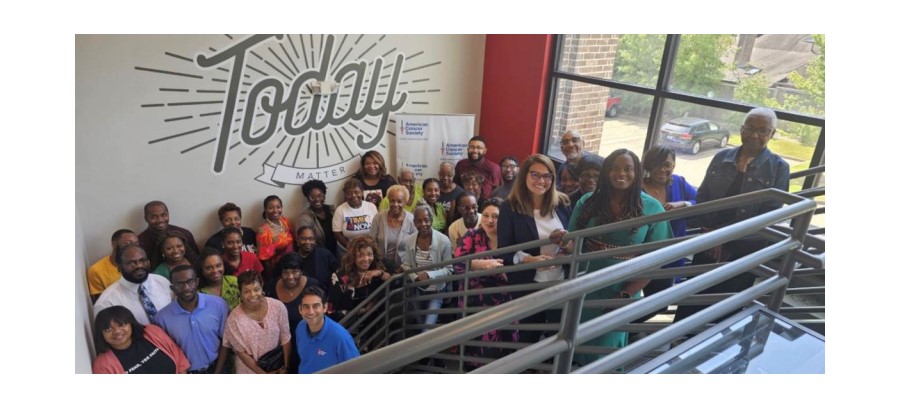This post is sponsored by the American Cancer Society
Longstanding systemic health inequities in communities of color were exacerbated during the pandemic and the cancer care equity gap widened. For example, for most types of cancer, Black people have the highest death rate and shortest survival of any racial/ethnic group in the United States, according to the American Cancer Society’s Cancer Facts & Figures for African American/Black People.
Through a powerful collaboration, the American Cancer Society, American Heart Association, American Diabetes Association, and the University of Michigan School of Public Health, powered by Bank of America, are working to address the leading causes of death in communities of color. The four-year initiative launched in 11 cities in the United States, tailored to meet each community’s needs.

Tawana Thomas-Johnson is the Senior Vice President, Chief Diversity Officer at the American Cancer Society. Here she shares insight into why this collaboration for equitable health is essential to reduce the leading causes of death – heart disease, cancer, stroke, and diabetes – in communities of color.
Question: How does the American Cancer Society (ACS) play a role in closing the cancer equity gap and ensure that everyone has an opportunity to prevent, detect, treat, and survive cancer?
Tawana Thomas-Johnson: ACS is a leading cancer-fighting organization with a vision to end cancer as we know it, for everyone. Over 1.9 million new cancer cases are expected to be diagnosed in the U.S. in 2023. Cancer is the second most common cause of death in the U.S., exceeded only by heart disease. Through our integrated approach, with equity in cancer care for all at the center, we impact 55 million lives annually. Through Discovery we fund research breakthroughs in cancer prevention, detection, treatment, and survivorship totaling $430M in grants, and are the largest private nonprofit funder of cancer research in the U.S. Through Advocacy we champion equitable access to breakthroughs in cancer prevention, detection, treatment, and survivorship with a presence at every level of government across 50 states, the District of Columbia, Puerto Rico, and Guam. Through Patient Support we provide direct support and education for cancer patients, caregivers, and clinicians such as prevention, screening, lodging, transportation, navigation, survivorship, and education in 20,000+ communities across the country.
Q: Why is partnership so important to continue this work?
Thomas-Johnson: ACS cannot achieve our goal to end cancer as we know it, for everyone, alone. We work with a diverse group of partners to address the multifaceted factors that contribute to cancer disparities. ACS has expertise in cancer prevention, early detection, treatment, and survivorship, but we do not have expertise in all areas that contribute to cancer disparities. For example, we partner with government agencies and other organizations to address social determinants of health, such as poverty and lack of access to healthy food. We also partner with businesses and corporations to raise funds and to promote cancer prevention and early detection. Partnerships allow us to share resources, such as funding, expertise, and volunteers to amplify the impact of our work and reach more people with our lifesaving mission. Partnership also helps us build trust and credibility in diverse communities which is essential for us to be effective in our work to advance cancer care equity for all.
Q: Explain the Collaboration for Equitable Health and what ACS aims to accomplish during the four-year initiative?
Thomas-Johnson: The Collaboration for Equitable Health is a four-year initiative that aims to improve health outcomes in communities of color, specifically focusing on heart disease, cancer, stroke, and diabetes. The collaboration focuses on three key areas: education and capacity-building for health systems, partners, and patients; increasing access to health screenings and preventive care; and advocating for policies that ensure fair opportunities and resources with state and local leaders. Powered by Bank of America, with the University of Michigan School of Public Health measuring impact, the initiative is currently operating in 11 U.S. cities.
Q: Preventive care is imperative to improve cancer outcomes. Share how ACS plans to increase access to health screenings and preventive care for people of all ethnic and racial backgrounds.
Thomas-Johnson: Through programs like the Health Equity Ambassador (HEA) program, ACS is committed to addressing the unequal burden of cancer in underserved and historically marginalized communities, by partnering with organizations to mobilize a volunteer workforce of trained Health Equity Ambassadors to prevent, detect, and treat cancer early. African American/Black, Hispanic/Latino, and uninsured individuals are more likely to develop or die from cancer than the general U.S. population. The goal of the Health Equity Ambassador (HEA) program is to promote cancer care equity and reduce cancer screening disparities through community outreach and education.

Kimelyn Harris, SVP, is the program executive within the Charitable Foundation at Bank of America. In this role, she is responsible for executing programming to support the bank’s ongoing efforts to advance economic opportunity, health care initiatives and social equality, for under-resourced communities.
Here, she shares more about the Bank of America collaboration with the American Cancer Society.
Question: Bank of America is partnering with ACS and other organizations to improve health and health care across the U.S. Share more on why you decided to partner with ACS, in what ways the collaboration supports your company’s mission, and how Bank of America is playing a role in providing equitable access to quality health care.
Kimelyn Harris: At Bank of America, through Responsible Growth, we deliver for our teammates, clients and shareholders, while addressing economic mobility, and social progress focused on the needs of the community. Every person deserves the opportunity for a full and healthy life. Poverty, income disparities, food insecurity and the lack of healthy housing have significant implications for health risk and the ability to access quality health care.
In response, we are collaborating with three leading organizations in the space of health equity, including the American Cancer Society, with the goal of catalyzing change. We are striving toward health equity for a simple reason, lives are at stake. People suffer when they lack access to quality care.
As we support efforts to advance economic opportunity for under-resourced communities, we must consider the whole person including housing, jobs, and small business support with a keen focus on access to quality community-based health care. It’s imperative that the public and private sectors work together to make impactful change to advance health equity.
Q: What impact do you see this partnership having for people with cancer and their families in communities of color?
Harris: The Collaboration for Equitable Health aims for lasting behavioral change and sustainable impact across outcomes, including uptake and integration of evidence-based clinical guidelines and interventions, and advocacy to address inequity, decrease disparities in disease burden, and improve outcomes when people living with cancer and their families seek care, manage their conditions, and advocate for themselves and their health. Learn more here.
The groundbreaking Collaboration for Equitable Health is in year two and making an impact across our country. As a key leader in this effort, the American Cancer Society strives to eliminate health disparities in communities of color and further cancer care equity for all. Learn more about partnering with the American Cancer Society to be part of this impactful journey to ending cancer as we know it, for everyone.
